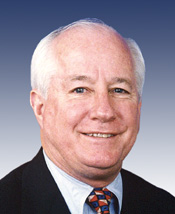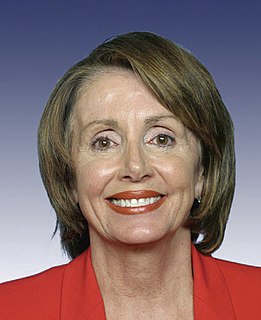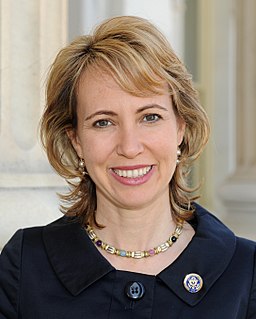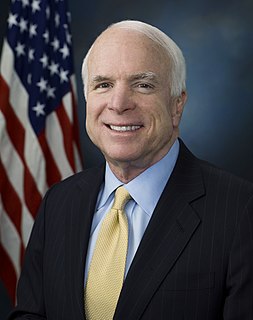
James Thomas Kolbe is a former Republican member of the United States House of Representatives for Arizona's 5th congressional district, 1985–2003 and 8th congressional district, 2003–2007.

The 2006 United States House of Representatives elections were held on November 7, 2006, to elect members to the United States House of Representatives. It took place in the middle of President George W. Bush's second term in office. All 435 seats of the House were up for election. Those elected served in the 110th United States Congress from January 3, 2007, until January 3, 2009. The incumbent majority party, the Republicans, had won majorities in the House consecutively since 1994, and were defeated by the Democrats who won a majority in the chamber, ending 12 years in opposition.

Gabrielle Dee Giffords is an American politician from Arizona and a gun control advocate. As a Democratic member of the United States House of Representatives, she represented Arizona's 8th congressional district from January 3, 2007, until her resignation on January 25, 2012, after surviving an assassination attempt that left her with a severe brain injury. She is the third woman in Arizona's history to be elected to the U.S. Congress. Considered a "Blue Dog" Democrat, her focus on health care reform and illegal immigration were sources of attention for those opposed to her candidacy and made her a recipient of criticism from various liberal groups.

The 2006 congressional elections in Arizona were elections for Arizona's delegation to the United States House of Representatives, which occurred along with congressional elections nationwide on November 7, 2006. Arizona has eight seats, as apportioned during the 2000 United States Census. Prior to the election, Republicans held six of the eight seats and Democrats held two. In the 8th district, Republican Congressman Jim Kolbe retired, leaving an open seat. Following the elections, Democrats gained two seats at the expense of the Republicans, who lost two.

The 2006 California 11th congressional district election was an election for the United States House of Representatives in California's 11th congressional district. The two major party candidates were longtime Republican incumbent Richard Pombo and Democratic challenger Jerry McNerney. Both faced serious challenges in their respective primaries, on June 6, 2006.

The 2006 Nevada 2nd Congressional District Election was held on November 7 to elect a representative from the Nevada's 2nd congressional district, which covers all of Nevada outside Clark County, and some parts of Clark County. Republican Party candidate Dean Heller won the election. It was an open seat because the incumbent, Republican Jim Gibbons, made a successful run for governor.

The Arizona 1st congressional district election, 2006 was an election for the United States House of Representatives. The two main candidates were two-term Republican incumbent Rick Renzi and Democratic civil rights attorney Ellen Simon. Renzi defeated Simon by a 52% to 44% margin.

The Nevada congressional elections of 2006 took place on November 7, 2006 when each of the state's three congressional districts elected a representative to the United States House of Representatives. Although President George W. Bush captured the state in both the 2000 and 2004 elections, he did so with a very slim margin. Nevada was considered a battleground state due to the close victory margins.

The 2008 congressional elections in Arizona were held on November 4, 2008, to determine who would represent the state of Arizona in the United States House of Representatives, coinciding with the presidential election. Representatives are elected for two-year terms; those elected would serve in the 111th Congress from January 4, 2009, until January 3, 2011.

On November 7, 2006, New York, along with the rest of the country held elections for the United States House of Representatives. Democrats picked up 3 House seats, the 19th, the 20th, and the 24th.
Timothy S. Bee is a Republican politician and business owner who served in the Arizona State Senate from 2003 to 2007. He was first elected to the Arizona Senate in 2001 and left in 2009 due to term limits. In 2008, he was the Republican candidate for Arizona's 8th congressional district seat in the United States House of Representatives. He lost to incumbent Democrat Gabrielle Giffords. Arizona Governor Jan Brewer later appointed him to head her Tucson office.

The 2008 United States presidential election in Arizona took place on November 4, 2008, and was part of the 2008 United States presidential election. Voters chose 10 representatives, or electors to the Electoral College, who voted for president and vice president.

The 2010 congressional elections in Arizona was held on November 2, 2010, to determine who will represent the state of Arizona in the United States House of Representatives. Arizona has eight seats in the House, apportioned according to the 2000 United States Census. Representatives are elected for two-year terms; those elected will serve in the 112th Congress from January 3, 2011 until January 3, 2013.

The 2012 United States Senate election in Arizona was held November 6, 2012, alongside a presidential election, other elections to the United States Senate in other states, as well as elections to the United States House of Representatives and various state and local elections. Incumbent Republican U.S. Senator Jon Kyl, the Senate Minority Whip, decided to retire instead of running for reelection to a fourth term. Republican U.S. Representative Jeff Flake won the open seat. As of 2019, this is the last election in which Republicans have won the Class 1 Senate Seat in Arizona.

Ronald Sylvester Barber is an American politician. He was a member of the United States House of Representatives from 2012 to 2015. Barber, a member of the Democratic Party from Arizona, served as district director for U.S. Representative Gabrielle Giffords before Giffords resigned her seat due to the severe injuries she sustained in an assassination attempt, during which Barber was also injured. He won the Democratic nomination for the special election to finish Giffords's term and was sworn into office on June 19, 2012.

The 2012 United States House of Representatives elections in Arizona were held on Tuesday, November 6, 2012, to elect the nine U.S. Representatives from the state, one from each of the state's nine Congressional districts, including the newly created 9th district following the 2010 United States Census. The elections coincided with other federal and state elections, including a quadrennial presidential election, and a U.S. Senate election. Primary elections were held on August 28, 2012.

A 2012 special election in Arizona's 8th congressional district was held on June 12, with primary elections held on April 17, to fill a seat in the United States House of Representatives for Arizona's 8th congressional district until the 112th United States Congress ends on January 3, 2013. The election was caused by the resignation of Representative Gabrielle Giffords on January 25, 2012, to concentrate on recovering from her injuries from the 2011 Tucson shooting. The seat was won by Ron Barber, a former aide to Giffords who was wounded in the attempt on her life.
Frank Ronald Antenori was a Republican member of the Arizona Senate, based in Tucson, Arizona.

Randall S. Friese is an American surgeon and politician from the state of Arizona. A member of the Democratic Party, Friese serves in the Arizona House of Representatives.



















